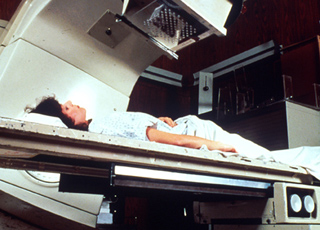How do certain chemotherapy agents make tumors more radiosensitive? — Barry A. Cochran
Radiation therapy uses high energy x-rays or gamma rays and particles such as neutrons and electrons to kill cancer cells. It works by damaging DNA, causing the cells to stop dividing or die. When the damaged cells die, they are broken down and eliminated by the body’s natural processes. Systemic chemotherapy uses anticancer drugs that enter the bloodstream and reach all areas of the body.
Research has found that certain chemotherapy drugs can potentiate radiation therapy when used at the same time. Although concurrent therapy may increase side effects, studies have shown it improves survival for patients with certain cancers.
The combination of chemotherapy and radiation therapy given at the same time is sometimes called chemoradiation or radiochemotherapy. For some types of cancers, this combination treatment may kill more cancer cells and increase the likelihood of a cure, but it can also cause more side effects. Researchers are currently studying radiosensitizers and radioprotectors, chemicals that modify a cell’s response to radiation. Radiosensitizers are drugs that make cancer cells more sensitive to the effects of radiation therapy.
In addition, some anticancer drugs such as fluorouracil (Adrucil, 5-FU) and cisplatin (Platinol-AQ) make cancer cells more sensitive to radiation therapy. Chemoradiation can help the radiation work more efficiently and can also reduce the chance that the cancer will spread. Chemoradiation may be used by itself or before or after surgery. — K. Lynne Quinn, RN, MSN, CRNP, AOCNP
